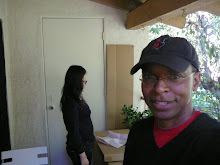
Happy Lunar New Year! The Chinese virtually ignore January 1 and instead celebrate their own New Year a few weeks later. This week-long celebration includes a countdown to midnight on a specific day, but it also is marked by grandiose displays of fireworks and indoor and outdoor decorations.
The fireworks displays in Beijing are completely home-grown. Citizens buy their stash of fireworks, just like people do in the U. S., except they purchase 10 times more stuff. There's no organized display set-up by a bank or radio station. Chinese folks simply take their fireworks to the nearest parking lot, curbside, or street, and light the fuse. During countdown night, the fireworks begin at around 11:45 p.m. and last continuously for a solid half-hour. Then, for the next week, all you hear is a dull roar and the occasional outta-nowhere series of blasts.
Since Beijing is a real urban environment, some of the fireworks don't rise above the 10th floor of the nearest high rise apartment or office building (no one shoots from the roof). The folklore goes that the loud noise scares away evil spirits and clears the way for good luck for the new year. I tried to explain to my co-workers that in the U. S., the sound of firecrackers is indistinguishable from gunshots, so personal fireworks displays are "illegal" in many parts of America. Besides, we believe evil spirits can be dispatched more quickly and effectively using bullets.



